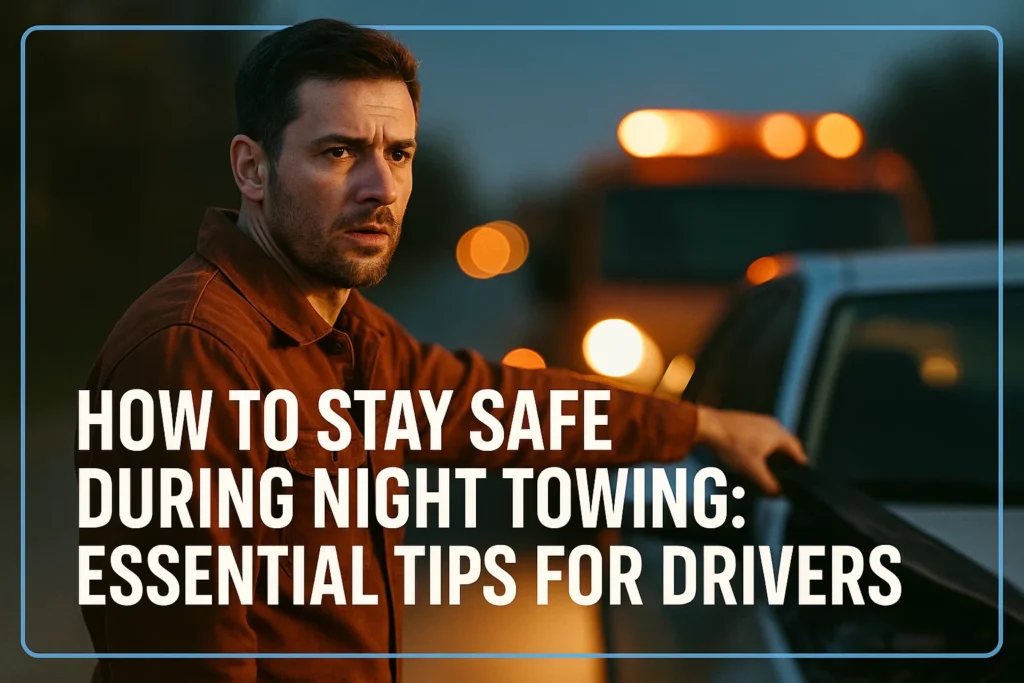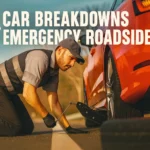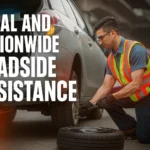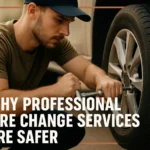When your car breaks down in the middle of the night; not only is it an inconvenience, but it is straight out nerve-racking! Even common roads become unfamiliar to the darkness, and lower visibility, slighter traffic, and fatigued proposals of drivers do not make the situation less stressful but add to the greater level of risks. You may be alone and unconfident about whom to contact and be concerned about how to remain safe before help comes.
The fact is, you do not face the same problem at night as you do during the day; you are at more risk and the decisions you make during the first few minutes are the ones that will determine how safe you will be. This manual explains why towing at night is more dangerous and provides you with effective, easy-to-follow steps on how to remain safe and secure, your car, and other drivers on the road.
Why Nighttime Towing Requires Extra Precaution
Night towing is not simply daytime towing in the dark it is associated with its own set of problems that can very easily turn an otherwise simple roadside stop into a hazardous situation. The low visibility, the unstable traffic flow, as well as the peaceful silence of late hours can all serve as factors causing the need to take additional precautions. One may ignore them which may add to the chances of accidents, injuries, or even a threat to personal safety. This is the reason vigilance is very crucial:
- Low Visibility: You can only see so far with your headlights ahead and other drivers might not see your vehicle until too late. Poor lighting creates a problem of recognizing debris, uneven shoulders, or an approaching hazard as well.
- Faster Reaction Time: A lot of drivers on the road at night are tired, distracted or alert. With fatigue, one has a little reaction time that can cause their reflexes to be late, to avoid your stopped vehicle.
- More Wildlife Traffic: In forested or rural areas, deer, raccoons, or coyotes become more active at night, creating abrupt traffic risks not only to you but also to oncoming traffic.
- Limited Assistance Availability: Not all towing or roadside services are available all the time; hence, you might wait more than you would during the day, and that waiting time usually occurs in dim or remote places.
- Risk of Criminal Activity: Unfortunately, it is not unlikely in case of stuck drivers at night, they could be subjected to theft, fraud, or other unsafe situations, particularly when they are not in isolated areas.
10 Tips for Essential Nighttime Towing Safety
In the case of an instance where one is towing at night, preparation and presence of mind is everything. Highway visibility at night is impaired to all users of the road and protective measures need to be taken to safeguard you, your passengers, and your vehicle. So here are 10 practical safety tips to keep in mind when dealing with a nighttime towing situation:
1. Pull Over to a Safe Spot
Pull off the highway as much as you can and preferably into a bright location where you can be seen, like a parking area, gas station or a wide shoulder. The greater the visibility, the less chance has another driver to hit and damage your vehicle accidentally. It is best not to pull over in blind curves and steep hills or narrow streets where there may be no time available to passing drivers.
2. Turn On Hazard Lights Immediately
Your first defensive mechanism to warn other vehicles that you are stopped entails your hazard lights. When you get pulled over turn them on and continue on them until the tow is over. This works well so that drivers in both directions can see you earlier.
3. Use Reflective Triangles or Flares
In case you do have emergency reflectors or even road flares, put them between 10 to 15 feet behind your car, facing oncoming traffic. This alerts other drivers ahead of time, particularly in dark or poorly lit streets, and makes the chance of a rear-end collision a lot less risky.
4. Stay Inside the Vehicle if Unsafe to Exit
To look at it socially, in crowded highways, on roads with a lot of traffic, you are better off sitting inside your car with a seat belt on till the tow truck comes. When you have to get out, you should carefully get out on the side of the car that is not facing the traffic.
5. Call a Trusted 24/7 Towing Service
When you are stranded, do not waste time finding assistance. Keep the number of a handy 24-hour towing company, such as Burnham Towing, on speed dial. This will also guarantee that you will find help fast and wherever you are.
6. Wear High-Visibility Clothing
In case you have to be outside at night, put on bright or reflective clothes so as to ensure that you are seen by other drivers even before they get near you. A reflective vest is perfect and should be included in your emergency car kit.
7. Keep Communication Devices Charged
Your phone is what can be called a lifeline in an emergency. Keep it charged at all times and carrying a full portable power bank can be great in case you want to remain connected with your towing service and family members.
8. Inform a Friend or Family Member
Write down the location and give someone you trust your coordinates before you wait with the tow truck. This will give an additional kind of security in case of anything unexpected.
9. Avoid Accepting Help from Strangers
Although part of the offers of help is sincere, it is safer to say no and wait till your towing service arrives. It means accepting the assistance of people you do not know may place you in danger, particularly when you are in an isolated place at night.
10. Stay Calm and Patient
The pandemic will not help nor reduce the stress. Pay attention to being conscious, being more aware of what surrounds you, and being able to respond to the instructions of the tow operator after they come.
How to Stay Safe During Night Towing Situations
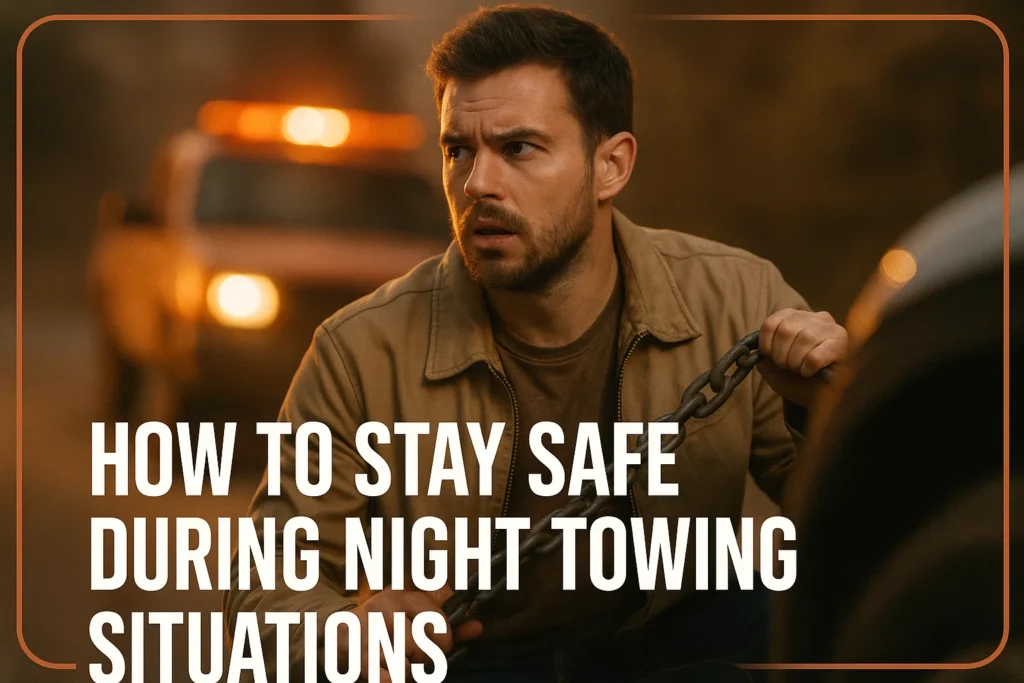
Your safety is also important even when your tow truck has arrived. The following are the steps to remain safe in the towing process:
- Communicate Clearly with the Tow Operator: Ask him to provide communication to the tow operator as well as the precise location of the place and any possible dangers (such as traffic, sharp curves, lack of lighting). This will guarantee the driver goes with the good tools and in the safest manner.
- Stand in a Safe Location During Hookup: Be way far off tow cables, chains and moving equipment. The high tension are on these and they may injure in case they break or move. Take the position on the other side of the road or behind a guardrail.
- Keep Your Belongings Secure: Take important items like your wallet, phone, documents, and electronics into the tow truck with you. This reduces the risk of loss or theft, especially at night. Remember to put inside the tow-truck any necessary items such as your wallet, phone, documents and electronics. This reduces the risk of loss or theft, especially at night.
- Double-Check the Tow Destination: Check on the exact drop-off point before you leave the scene. Ensure that you provide the correct address to your car towing company so as to prevent wastage of time or misunderstandings.
Emergency Towing Precautions After Dark
A typical night towing scenario is in rather stressful urgent cases; it might be an emergency call, a sudden failure or even being in the wrong place, at the wrong time. Darkness, poor traffic and the emergency make it a requirement to be even more careful, having to wait to be rescued. Here is how to guard yourself until the tow truck arrives:
- Plan Ahead: You should research and save the contact information of a trustworthy 24-hour tow service in your community away before you ever require a simple tow. Thus, in case something bad happens to us at night, we can just dial one number rather than easing under pressure and searching on the web.
- Pack an Emergency Kit: They should also travel with an emergency kit in their vehicles which contains necessities. An extra set of batteries, glowing safety vest, jumper cable, first-aid kit, bottled water and simple tools can help in a big way to keep you prepared and safe.
- Stay Visible: Your biggest road hazard at night is a lack of visibility. Flash all the tools you can get- hazard lights, road flares, reflective triangles, or LED strobes- in order to make your vehicle visible to coming traffic at a long distance.
- Keep Your Doors Locked: If you are in your car and waiting, then make sure you lock the doors, particularly in isolated or poorly lit areas. Open them only when an arriving verified tow operator arrives.
- Stay Alert to Surroundings: Try to check constantly what is happening around you, be it a car coming behind you or anything that looks suspicious. Go with your gut- if it does not feel right, take some precautions like relocating to safer, more visible place where feasible.
Preventing Accidents During Nighttime Towing
Night towing has its risks and it becomes more risky when the process is rushed or done by a person who is inexperienced. When you take the right measures, the probability of accidents involving you and other road users can be minimised. Here is how to make things about as safe as can be:
- Choose a Professional Tow Service: Select a valid and quality towing service. The trained operators have experience with night recoveries, navigating dark roadways and appropriate safety gear to employ. Firms such as Burnham Towing have the experience to keep risks minimal.
- Ensure Proper Lighting: propping up adequate and proper work lighting onto the tow truck so that your vehicle and the area takes the form of light duty. Proper lighting assists the operator with an efficient mode of work and makes the tow site more noticeable to the passing drivers.
- Clear the Roadway Quickly: The longer you stand near the road the more risk there is. They will be able to tow your vehicle to a secure area and out of the way, and a skilled tow operator will be able to do so quickly, facilitating a reduction in accidents.
- Follow Traffic Laws: Both the driver of the tow truck and of the towed car should observe the speed laws, lane requirements, and any local towing tags in the place of operation. This avoids accidents and makes the tow smoother and safer.
Conclusion
How to Stay Safe During Night Towing isn’t only referencing the laws you need to understand how to stay safe it’s how to stay mindful, on your toes and make rational decisions in periods of stress. Towing during the nighttime should not be uneasy and stressful, as long as you remember about the hazards. With some basic and effective measures, such as flipping on your hazard lights at once, stopping in a safe location, and phoning a reputable towing company like the one at Burnham Towing, you can greatly reduce potential dangers.
Stranded? Day or Night, Burnham Towing Delivers Fast, Reliable, and Safe Service. We’ll Get You Back on the Road Stress-Free.
FAQ’s:
Put your hazard lights on immediately, drive your vehicle to where it is safe and visible to other people, and immediately contact an efficient 24/7 towing service.
To stay safe, it’s best to politely decline and wait till the professional towing service that you called shows up. This assists in being responsible for reducing risk.
When you have to get out of the car, you should turn on the hazard lights, lay reflective triangles (or other flares) behind the car, and dress in high-visibility pieces of clothing.
All of these should be covered in a well-stocked kit, including a flashlight (with extra batteries), a reflective safety vest, a first-aid kit, a phone charger (portable), and emergency flares or LED strobes.

